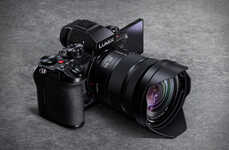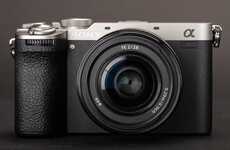
The SIGMA fp is the Smallest of Its Kind on the Market
Daniel Johnson — July 16, 2019 — Tech
References: sigmacanada & engadget
The SIGMA fp will be the smallest full-frame mirrorless camera in the world. SIGMA has not indicated as to when the camera will be released, however, the company has similar models which max out at a $1,200 price point.
The SIGMA fp features a 24.6-megapixel design with a 35mm full-frame Bayer sensor. The camera has a lightweight design, weighing in at less than a pound when the memory card and battery are removed. The company regards the camera as a "pocketable full-frame camera," this is due to the camera's small design. The model measures in at 4.4 x2.75 x1.8 inches, the cameras compact size means it would fit in most user's hand.
Image Credit: SIGMA
The SIGMA fp features a 24.6-megapixel design with a 35mm full-frame Bayer sensor. The camera has a lightweight design, weighing in at less than a pound when the memory card and battery are removed. The company regards the camera as a "pocketable full-frame camera," this is due to the camera's small design. The model measures in at 4.4 x2.75 x1.8 inches, the cameras compact size means it would fit in most user's hand.
Image Credit: SIGMA
Trend Themes
1. Full-frame Mirrorless Cameras - Smaller, lighter, and more affordable cameras are gaining popularity among consumers and are disrupting the photography industry.
2. Pocketable Camera Design - Compact camera designs enable users to take high-quality photos on the go and are disrupting the traditional camera form.
3. High-quality Sensors - Advancements in sensor technology are enabling cameras to capture higher quality images, disrupting the need for large and expensive traditional cameras.
Industry Implications
1. Photography - The photography industry is experiencing rapid transformation with new and innovative camera designs being introduced.
2. Consumer Electronics - The consumer electronics industry is being disrupted by high-quality, compact and affordable cameras that appeal to a broader consumer base.
3. Artificial Intelligence - The integration of AI into cameras is disrupting the photography industry by enabling cameras to capture and process more data, producing higher quality images.
3.2
Score
Popularity
Activity
Freshness























